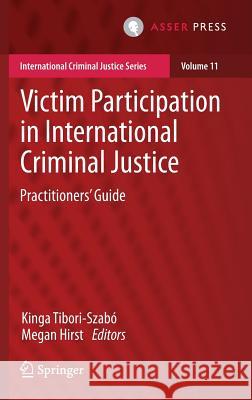Victim Participation in International Criminal Justice: Practitioners' Guide » książka
topmenu
Victim Participation in International Criminal Justice: Practitioners' Guide
ISBN-13: 9789462651760 / Angielski / Twarda / 2017 / 479 str.
Kategorie:
Kategorie BISAC:
Wydawca:
T.M.C. Asser Press
Seria wydawnicza:
Język:
Angielski
ISBN-13:
9789462651760
Rok wydania:
2017
Wydanie:
2017
Numer serii:
000763298
Ilość stron:
479
Waga:
0.86 kg
Wymiary:
23.39 x 15.6 x 2.69
Oprawa:
Twarda
Wolumenów:
01
Dodatkowe informacje:
Wydanie ilustrowane











